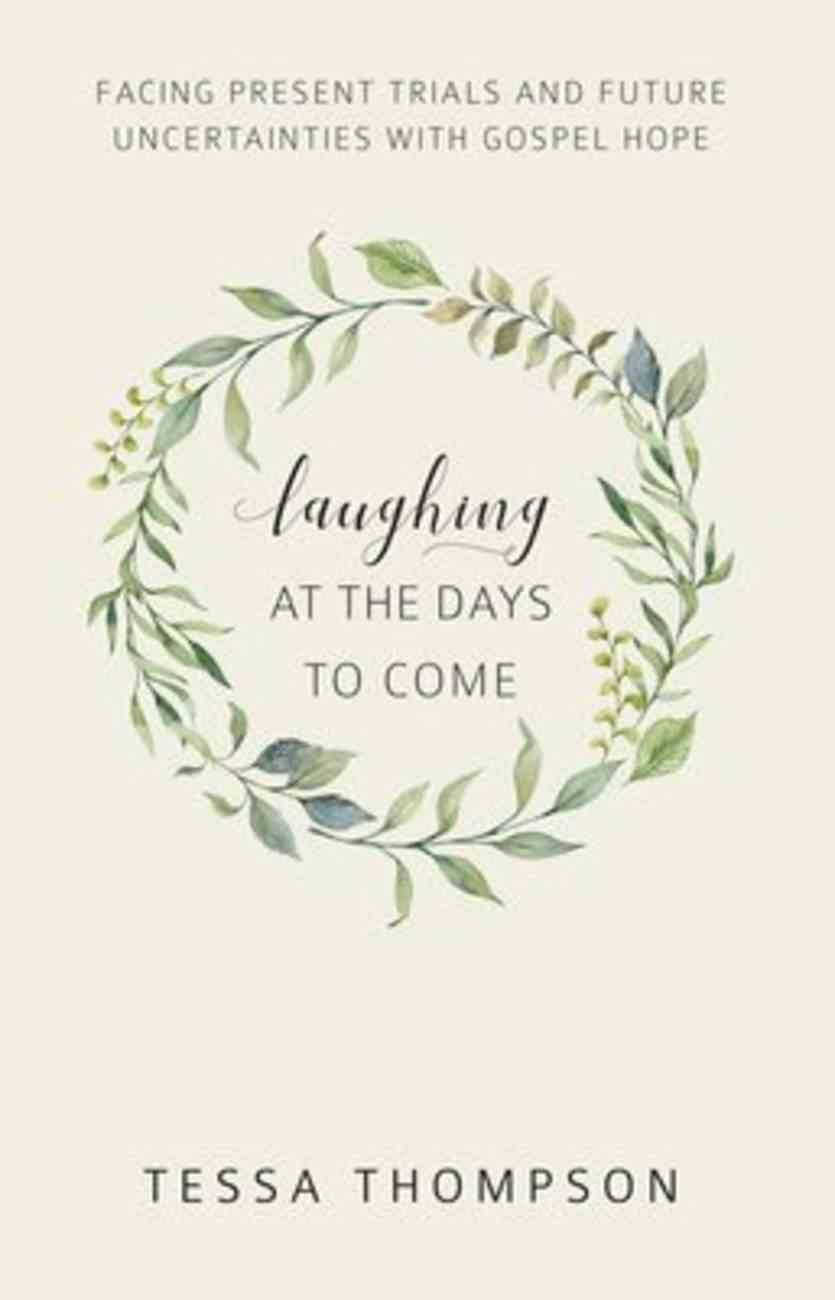The author of Laughing at the Days to Come, Tessa Thompson, is like us in many ways. She is an eager wife and mother who desires to faithfully grow in trusting and obeying the Lord. However, Tessa has also been dealt difficult cards in life that many of us have not. She suffers from chronic pain. She has been permanently deaf since her teens. And amidst these practical deficiencies she is learning how to parent two young boys.
This book is an outpouring of her feelings towards God’s decision to permit her long-term physical suffering; her frustrations over unanswered prayers for her hearing to return; and her wrestling with “the God who takes” (4). Her reflections spring from the Proverbs 31 woman, who is “clothed with strength and dignity” and “laughs at the days to come” (Proverbs 31:25). Tessa meditates on what this woman looks like (Chapters 1 to 4); how being rooted in the gospel enables her to imitate her (Chapters 5 to 8); and the impact of the new news on her expression of faith, including her prayer and church life, and her outlook on the brevity of life here on Earth (Chapters 9 to 11).
This book is an outpouring of her feelings… spring[ing] from the Proverbs 31 woman
Honest Reflections of a Hard Life
I am grateful for this book, primarily because Tessa addresses questions I naturally ask when faced with hardships: Where is my Heavenly Father when I am plagued with trials? Will God be with me when life gets increasing worse, hard, or lonely? Does God’s silence towards my prayers suggest some sort of hostility? A key strength of Laughing at the Days to Come is Tessa’s rawness and realness in asking deep questions and sharing her hardships. She does not shy away from acknowledging her doubts or self-confessed naive assumptions about God.
Tessa’s desire to grow in Christlikeness amidst suffering is also humbling. My favourite chapter is on church participation. She shares the practical inconveniences of being deaf at church: needing the sermon typed out beforehand; not being able to hear her church family sing; being unable to welcome newcomers or teach children at church. Yet even so, she maintains a high view of church – it is a place we can each “worship to grow in grace, walk with the body of Christ, and work to steward our gifts” (141).

Laughing at the Days to Come: Facing Present Trials and Future Uncertainties with Gospel Hope
Tessa Thompson
Laughing at the Days to Come: Facing Present Trials and Future Uncertainties with Gospel Hope
Tessa Thompson
She concludes her reflections by saying that she must resist the temptation to constantly look inwards in self-pity towards her limitations, but instead humbly accept God’s providence in her life, and look for ways God has granted her to serve. What a humbling response that challenges my own selfish perceptions of church! These convictions, of which there are many peppered throughout the book, are a testimony to the transformative work of the gospel, offering much encouragement to the reader.
What a humbling response that challenges my own selfish perceptions of church!
Impact Clouded by the Writing Style
A reviewer on the back-cover aptly describes the reading experience as though Tessa was “sitting across from you with a cup of coffee”. This conversational and relational style proved helpful in giving me a peek into Tessa’s life, enabling me to feel as well as hear her pain, reflections, and convictions from the Bible. However, this same writing style resulted in a book that sounded too wordy and repetitive, making it challenging for me to grasp Tessa’s main points or follow her train of thought as she sought to explain difficult biblical concepts. Many chapters could have benefitted from shorter, more succinct sentences. In addition, a more thoughtful selection of clarifying examples and questions would have been helpful, rather than the smorgasbord offered by the author. The fact that the book’s impact was clouded by its writing style is a shame, as Tessa’s story is compelling and her thoughts deserve to be mulled over.
The fact that the book’s impact was clouded by its writing style is a shame, as Tessa’s story is compelling and her thoughts deserve to be mulled over
Regardless, I appreciated the honesty that Tessa brings to her readers. Living life deaf is an unimaginable hardship, and I am grateful she has chosen to share her story with us. Tessa also concludes by offering her readers an encouraging truth: regardless of our circumstances, we can laugh at the days to come.
Our laughter is dependent on where we place our fears – not in the uncertainties of the future, but in the character of our trustworthy Lord. Yes, he gives and takes away (Job 1:21), but he is also the Father of Mercies (2 Cor 1:3-4), disciplining those he loves (Heb 12:5-6), and preserving both them and their inheritance until he calls them heavenward (1 Pet 1:3-5). Will we direct our fears and anxieties to him?















